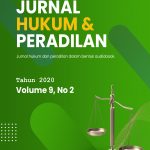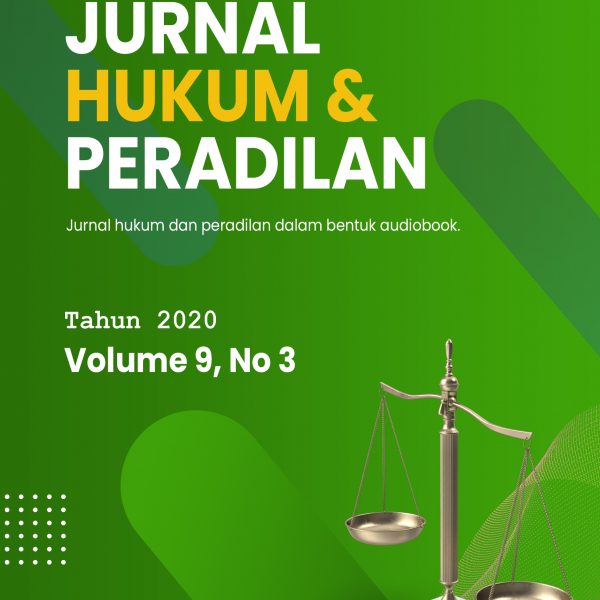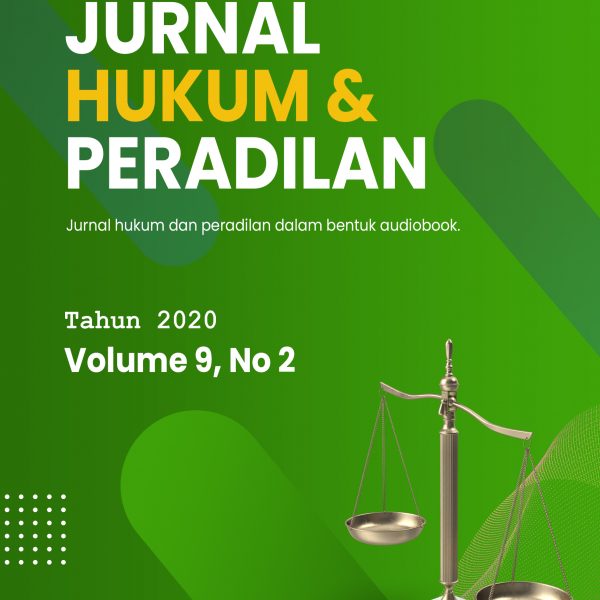
Jurnal Tahun 2020
Volume 9, No 1
Abstract.
This paper presents the perceptions of Indonesian Judges in sentencing minor drug offenders. The judge holds a central role in the sentencing process, and because of the judicial discretion they can use it is essential to understand how judges come to their sentencing decisions. To develop an understanding of how judges perceive their actions in decision-making and sentencing of drug users, a total of 31 participants were interviewed. The data demonstrated that the majority of minor drug offenders are from poorer backgrounds. Poverty was found to lead people to the drug culture. Moreover, lack of understanding of the harm caused by taking drugs and living under drug prohibition were considered as contributing factors to people involved in minor drug offences. Thus, minor drug offenders are considered by judges as victims of their circumstances. Within structural inequality, the imposition of harsh sentencing to minor drug offenders who suffer from socio-economic problems raises issues surrounding justice. Within the current legal structure of Indonesian courts, which are primarily retributive and have drug prohibitionist policies, the majority of participating judges consider drug sentencing as reflecting those prohibitionist policies. However, a substantial minority of participating judges interpreted the form of the sentence within available limits. These findings will contribute to the sociological understanding of the context in which judicial culture shaped the formation of the judiciary as a group and the impact of Islamic culture on the participating judge’s positive preference for rehabilitative problem-solving in the Indonesian context.
Abstract.
As an acceleration program for land registration in Indonesia that is directly led by the President, Complete Systematic Land Registration (PTSL) should provide a guarantee of legal certainty and protection regarding land ownership rights. However, in fact, the role of the land deed official (PPAT), as a public official who receives a mandate from the Governmental Regulation no. 24 of 1997 regarding Land Registration, is not found within the implementation of PTSL. The present research aimed to investigate the role of PPAT in the implementation of PTSL. Using normative legal approach, this study employed literature study to collect the primary data. This research found that PPAT does not have any role in regulatory legislation regarding PTSL. If we see Governmental Regulation no. 24 of 1997, all transfers occurring after the issuance of the regulation requires PPAT’s deed as written evidence of land ownership. The adjudication committee as the PTSL implementer supposes to collaborate with PPAT to make sure that PTSL meets the steps of juridical data collection in order to obtain an orderly, complete land registration that provides legal certainty regarding land ownership right.
Abstract.
Civil case trial based on HIR/RBg takes months or even more than a year, which sets a bad precedent for judicial institution because it tends to be complicated, and closed. A proverb voiced, “Reporting the loss of goats instead of missing cows,” increasingly the public’s negative impression towards judicial institution. Responding to these conditions, the Supreme Court issued a Supreme Court Regulation (PERMA) No. 1 of 2019 concerning Case Administration and Court Trials Electronically. The research questions, how is the implementations of electronic trial (e-litigation) on civil cases in Indonesia judicial institutions? The research method used is literature study, in particular normative legal research, which is descriptive analytical. PERMA No 1 of 2019 has provided benefits for internal judiciary and justice seekers. Where case registration is done electronically without needing go to court. The payment of court fees is simply by transferring to a virtual account and the summons of parties are carried out electronically to an electronic domicile. It is not just limited to that the trial is also carried out electronically, from the first trial until the reading of the judge’s verdict. However, there are challenges for the successful of electronic litigation from the aspect of legal substance, the electronic trial regulated at PERMA rule out HIR/R.Bg whose hierarchy is above of that PERMA. In aspects of legal structure, It is needed the completed infrastructure and human resources. As well as aspects of legal culture, the enthusiasm of justice seekers who use e-court services.
Abstract.
Contempt of ruler or public body are criminal offence which stipulated in article 207 and 208 Penal Code of Indonesia. In practice, there is legal uncertainty because substantially contradict to Constitutional Court Decision No.013-022/PUU-IV/2006 about contempt of President/ Vice President and No. 6/PUU-V/2007 about contempt of Indonesia Government. This paper wants to found criminal legal policy and constitutionality on contempt of ruler or public body. The research method used is juridical normative with regulation, doctrinal, and decision approaches. The result of study shows changes of criminal law policy on contempt of ruler or public body based on comparison of current Penal Code and future Penal Code Draft with changes elements of formulation: (1) suspect; (2) intention; (3) victim; (4) sanction; (5) impact of action, the norms also transform from general offence to complaint offense. Next, analysis to Constitutional Court decisions about contempt of President/Vice President and Indonesia Government which declared null and void, found related legal reasoning: First, violate freedom of expression; Second, violate right to get information; Third, causing legal uncertainty; Fourth, no longer suitable with society development; Fifth, changes in norms on Criminal Code Draft; Sixth; follow previous decision; Seventh, against universal value in international law. Then, the constitutional interpretation methods used in the decisions are: (1) Ethical Interpretation; (2) Historical Interpretation; (3) Futuristic Interpretation; (4) Doctrinal Interpretation. Therefore, according on similar legal reasoning and constitutional interpretation, article 207 and 208 Penal Code also supposed to be stated unconstitutional.
Abstract.
The existence of industrial relations courts until now still can not provide adequate legal protection to justice seekers. This article begins with the existing legal problems in the form of not implemented legally binding of industrial relations court verdicts. The unapplied verdicts have resulted in the exclusion of the rights of justice seekers. This paper identifies the problem related to normative perspective and provide solutions through legal reconstruction from the normative view. Then, the problems are examined using normative legal research methods based on statute approach and historical approach as well as case approach. By examining several research results it is known that the legal vacuum which regulates sanctions against those who do not intend to enforce industrial relations court rulings that have legal force still need to be addressed immediately to guarantee the rights of the seekers of justice in the industrial relations court. This paper recommends to establish a Supreme Court Regulation on the implementation of institutional force on industrial relations disputes cases and the need for amendment of Law Number 2 Year 2004 on Industrial Relations Dispute Settlement.
Abstract.
Indonesia is the second highest country in ASEAN in the prevalence of underage marriage after Cambodia and ranks 7th highest in the world for the absolute number of child brides. The tangent point of child marriage with the Religious Court enters through the case of marriage dispensation. As the authority of the Religious Courts, marriage dispensation is very dilemmatic and debatable because simultaneously the case is biased in value, between benefit, harmness, and community behavior. In sociology, society always changes and the difference is only in the nature or level of change. One of the fundamental aspects of the reflection of the Religious Court decisions that put forward efforts to prevent child marriages is to narrow the space for filing child marriage cases, examine the case more carefully by adding to the burden of proof, and the commitment of the parties to respond to the negative consequences of child marriages.
Abstract.
The article has questions from the background of the research as follows: how to protect consumers fintech transactions from financial technology companies? What are the innovations and challenges of the financial services authority in overseeing and issuing regulations related to fintech? The research method used is normative with the statute approach and conceptual approach. The technique of collection primary legal is carried out by collecting OJK regulations regarding fintech companies, and consumer protection. Meanwhile, the technique of collection secondary legal is the concept or theories related to the main issue complete with bibliography. The Results that found are the fintech companies must be registered in the financial services authority by obeying and implementing OJK regulations. Innovation that OJK did enact Supervisory Technology (Suptech) to develop the financial technology (fintech) corporate ecosystem that is included in the realm of Digital Financial Innovation (IKD) on the OJK portal with the name Gerbang Elektronik Sistem Informasi Keuangan Digital. OJK also established the Innovation Center or Fintech Center in 2018. Challenges OJK must face: fintech lending is to create a balance between increasing financial inclusion and risk management, improving people’s understanding of fintech services, infrastructure, cybersecurity and data protection for consumers and fintech must collect more consumer data so that the lending and borrowing process becomes more efficient and effective.
Abstract.
The UK has incorporated the strict liability principle in dealing with the environmental offence in its legislations. However, the principle application has some detrimental impacts. This article aims to discuss strict liability crimes in the UK’s environmental legislations and civil penalties in the UK, the detrimental effects of applying its principle and the reasons for supplementing criminal penalties for environmental offences with civil penalties. This will be done through the adoption of a doctrinal legal research method. The incorporation of strict liability principle in the UK’s legislations can be found in the Environmental Protection Act 1990, the Water Resources Act 1991, Part 2A of the Environmental Protection Act 1990 and the Environmental Permitting (England and Wales) Regulations 2010 (SI 2010 No. 675). The detrimental effects of the principle application are the ignorance of mens rea element, unfair trial, ineffective environmental damage prevention, and contradictory to release right. The reasons for applying civil penalties of criminal law violation in regard with violating environmental law are this punishment is possible to be imposed on companies, it strengthens another kind of non-criminal sentence sanction, it is a peaceful solution, a polluter may manage by himself to repair the damage, it has no stigma on the polluter and it has wider law enforcement form. There is a dearth of literature looking at the latest UK’s legislation incorporating strict liability principle application. This article will fill this literature gap.






